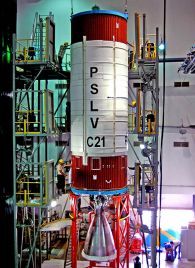 India's launch preparations for the ambitious Rs 450 crore Mars orbiter mission achieved a major milestone with the successful thermo-vacuum test of the spacecraft with its payloads (scientific instruments).
India's launch preparations for the ambitious Rs 450 crore Mars orbiter mission achieved a major milestone with the successful thermo-vacuum test of the spacecraft with its payloads (scientific instruments).
It extensively tested the spacecraft under simulated space environment. The spacecraft would now undergo vibration and acoustic tests before being transported from here by month-end to the spaceport of Sriharikota, where the launch campaign has already commenced.
The spacecraft is slated to be launched by Polar Satellite Launch Vehicle (PSLV-C25) during October 21-November 19. The first stage of PSLV-C25 with strap-ons has already been assembled, with the rocket ready for satellite integration by October ten, officials of Indian Space Research Organisation said.
The ISRO said the primary objectives of the mission are to demonstrate India's technological capability to send a satellite to orbit around Mars and conduct meaningful experiments such as looking for signs of life, take pictures of the red planet and study Martian environment.
The satellite will carry compact science experiments, totalling a mass of 15 kg. There will be five instruments to study Martian surface, atmosphere and mineralogy. After leaving earth orbit in November, the spacecraft will cruise in deep space for 10 months using its own propulsion system and will reach Mars (Martian transfer trajectory) in September 2014.
The 1,350 kg spacecraft subsequently is planned to enter into a 372 km by 80,000 km elliptical orbit around Mars.
"We want to look at environment of Mars for various elements like Deuterium-Hydrogen ratio. We also want to look at other constituents -- neutral constituents", ISRO Chairman K Radhakrishnan told PTI recently.
"There are several things which Mars will tells us, this is what the scientific community thinks about the life on Mars", he had said.
"Our (Mars mission) experiments are planned in such a way that you can decide when you want to put on each of these systems," Radhakrishnan had said.
"If we succeed (in the mission), it positions India into group of countries who will have the ability to look at Mars. In future, certainly, there will be synergy between various countries in such exploration. That's taking place. That time India will be a country to be counted", he said.











 © 2025
© 2025